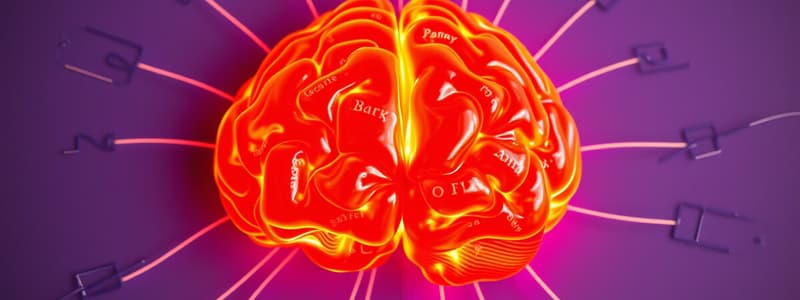Podcast
Questions and Answers
Match the memory techniques with their descriptions:
Match the memory techniques with their descriptions:
Memory tricks = Using visualizations to aid recall Understanding material = Grasping concepts for better retention Repetition = Practicing information to remember it Complications = Factors that hinder memorization processes
Match the items with their relevance in context:
Match the items with their relevance in context:
Flying a kite = The primary topic of the passage Seashore = A better place for certain activities Playing cards = Example of a memory competition Newspaper = Preferred over a magazine for content
Match the challenges with their descriptions:
Match the challenges with their descriptions:
Simplicity = Easier to remember when understood Complications = Can make memorization difficult Skill = Required to successfully engage in tasks Room = Needed to avoid overcrowding in activities
Match the people with their achievements:
Match the people with their achievements:
Match the concepts with their key points:
Match the concepts with their key points:
Match the techniques of memory retention with their descriptions:
Match the techniques of memory retention with their descriptions:
Match the types of questions asked in the memory study with their focus:
Match the types of questions asked in the memory study with their focus:
Match the terms with their associated concepts in memory retention:
Match the terms with their associated concepts in memory retention:
Match the memory enhancement techniques with their examples:
Match the memory enhancement techniques with their examples:
Match the groups with their respective tasks in the word study:
Match the groups with their respective tasks in the word study:
Match the concepts of memory with their characteristics:
Match the concepts of memory with their characteristics:
Match the memory strategies with their potential outcomes:
Match the memory strategies with their potential outcomes:
Match the findings of the memory study with their implications:
Match the findings of the memory study with their implications:
What is a suggested technique to enhance memory retention?
What is a suggested technique to enhance memory retention?
Why was the example of the passage about flying a kite easier to remember?
Why was the example of the passage about flying a kite easier to remember?
What achievement is associated with Joshua Foer?
What achievement is associated with Joshua Foer?
What can complicate memory retention when studying unrelated sentences?
What can complicate memory retention when studying unrelated sentences?
What general moral can be drawn regarding memory from the provided examples?
What general moral can be drawn regarding memory from the provided examples?
What is suggested to enhance the retention of information in long-term memory?
What is suggested to enhance the retention of information in long-term memory?
Which group of participants was likely to remember the words best during the study?
Which group of participants was likely to remember the words best during the study?
What technique is described as making information more memorable through clever tricks?
What technique is described as making information more memorable through clever tricks?
Which factor is most important when trying to remember words according to the study?
Which factor is most important when trying to remember words according to the study?
Turning the hippocampus's function into a rhyme is an example of which memory enhancement technique?
Turning the hippocampus's function into a rhyme is an example of which memory enhancement technique?
What does the depth of processing imply in terms of memory formation?
What does the depth of processing imply in terms of memory formation?
Which of the following statements about memory enhancement techniques is true?
Which of the following statements about memory enhancement techniques is true?
According to the findings, how does thinking about the meaning of a word affect memory?
According to the findings, how does thinking about the meaning of a word affect memory?
Flashcards are hidden until you start studying
Study Notes
Long-Term Memory Strategies
- Rehearsal is insufficient for transferring information to long-term memory.
- Depth of processing emphasizes that deeper thinking and understanding enhance memory retention.
Study Illustration
- A study involved participants answering different types of questions about a string of 48 words:
- One group identified words in capitals.
- Another group identified which words rhymed with "train."
- A third group determined which words fit into a specific sentence structure.
- Results showed that participants who engaged with the meaning of words remembered them more effectively, highlighting the importance of semantic processing.
Mnemonics as Memory Aids
- Mnemonics utilize tricks or associations to enhance memory:
- Rhymes can help create connections, e.g., linking "hippocampus" with memorization by associating it with "finding my way through campus."
- Visual imagery, like picturing a fish for someone named Mr. Fish, aids in memory recall.
- Joshua Foer's Ted Talk demonstrates how memory tricks can lead to impressive feats, such as recalling the order of 52 playing cards.
Importance of Understanding
- Understanding material significantly improves memory retention:
- An unrelated paragraph becomes memorable when contextualized (e.g., framing sentences around the theme of kite flying).
- Struggling to understand concepts actively engages the learner, leading to better long-term retention.
Long-Term Memory Strategies
- Rehearsal is insufficient for transferring information to long-term memory.
- Depth of processing emphasizes that deeper thinking and understanding enhance memory retention.
Study Illustration
- A study involved participants answering different types of questions about a string of 48 words:
- One group identified words in capitals.
- Another group identified which words rhymed with "train."
- A third group determined which words fit into a specific sentence structure.
- Results showed that participants who engaged with the meaning of words remembered them more effectively, highlighting the importance of semantic processing.
Mnemonics as Memory Aids
- Mnemonics utilize tricks or associations to enhance memory:
- Rhymes can help create connections, e.g., linking "hippocampus" with memorization by associating it with "finding my way through campus."
- Visual imagery, like picturing a fish for someone named Mr. Fish, aids in memory recall.
- Joshua Foer's Ted Talk demonstrates how memory tricks can lead to impressive feats, such as recalling the order of 52 playing cards.
Importance of Understanding
- Understanding material significantly improves memory retention:
- An unrelated paragraph becomes memorable when contextualized (e.g., framing sentences around the theme of kite flying).
- Struggling to understand concepts actively engages the learner, leading to better long-term retention.
Studying That Suits You
Use AI to generate personalized quizzes and flashcards to suit your learning preferences.




